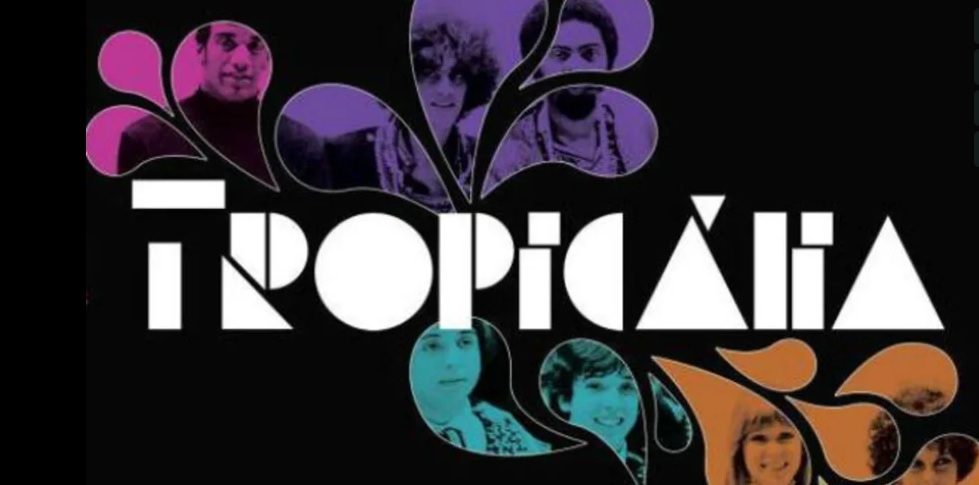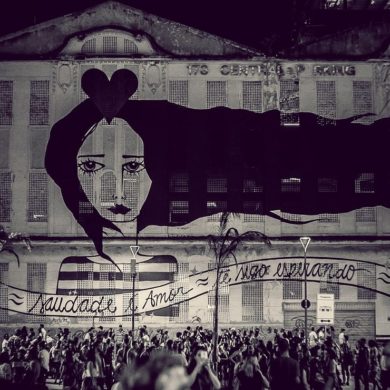This charismatic movement was born out of opposition to the military dictatorship then in power in Brazil, and a certain fascination with American and Anglo-Saxon rock. The Tropicália movement, although little known outside of Brazil was a veritable cultural revolution in the country. Like western psychedelic rock from which it borrowed its aesthetic styles, or the social movements of 1968 in France that influenced its political dimension, its impact on Brazilian society was decisive.
A movement born in an authoritarian political climate
The post-war years in Brazil ushered in a frenzy of economic development. Of course, this boom only served a small fraction of the population, namely the wealthy; people who ran big business and people who ran the country. In fact, the vast majority of inhabitants in both the cities and the countryside were not able to take advantage of these so-called “glorious years.” A vocal president, João Goulart, was elected in 1961 and advocated a more social policy alongside rapprochement with the Soviet bloc.
In the midst of the cold war, this was enough to ignite the powder: supported by the United States, a military junta led by Marshal Castelo Branco overthrew the president and established a military dictatorship that would lock in all sectors of Brazilian life.
What the leaders of the coup had not anticipated was the revolt that was about to explode a few years later and change the face of Brazil. “Tropicalism” had just made a notable entrance into the tumultuous history of the largest country in South America.
The “Summer of Love”, a trigger for Tropicalism
Brazilian society was rapidly evolving in the late fifties, economically but also artistically. In terms of music, the traditional and frantic samba was replaced by the sweet and elegant Bossa Nova, embodied by the likes of Vinicius de Moraes, Antônio Carlos Jobim and João Gilberto. The seducing sounds of “bossa” began to attract not only young Brazilian artists like Gilberto Gil, Chico Buarque and Caetano Veloso, but also the great American jazzmen who would make these suave tunes known to the world.
The eruption of military power during the famous “golpe” (coup d’etat) somewhat stopped the dissemination of Bossa Nova within the country. The music was considered intellectual and “left”. As they supressed its influence, the new leaders seemed assured of a certain calm.
The young artists mentioned above quickly felt the devious regime invading their daily lives and the rise of the dictatorship closing in on their creative freedom. For them, Jobim, Gilberto and co, represented the past. A past that they loved and learned from, but they felt it was time to move forward, to step further and turn the tables.
Meanwhile the world was vibrating to the sound of Pop Music from Europe and the ears of Gil, Veloso, Buarque and others thirsty for freedom heard the message. It was time for them to open to new sounds, to this revolutionary art that is Pop culture and to follow the Americans in their iconoclastic attitudes and kick back at the suffocating regime.
In June 1967, the first-ever international Pop Music Festival was held in Monterey. It had a worldwide impact. Monterey represented not only the advent of a musical phenomenon, but also the establishment of a new way of life: the rejection of consumer society and a turn towards an existence based on love, music and drugs. Thus began the famous “Summer of Love”, musically illustrated by the Beatles’ masterpiece, “Sgt Pepers lonely hearts club band”.
Brazilian musicians could not remain deaf to this call. A few months later, the Globo Record festival, takes place in Brazil, to which Caetano Veloso and Gilberto Gil are invited. They also wanted their Monterey and were going to let it be known.
A “tropical” musical and political protest
Veloso would sing his new song, “Alegria alegria.” Like Bob Dylan two years before, he didn´t hesitate to drop all acoustic backing to be accompanied by a new electric group. Caetano climbed onto the TV set surrounded by a group of musicians heavily influenced by Pop. The backing musicians were known as the Beat Boys and the music they played was heavily amplified by the loudspeakers behind them. Like the American master at the 1965 Newport Festival, and during his 1966 world tour, Caetano Veloso was also be booed and whistled at by most of the public. They did not accept the heresy of electric noise mixing with sacrosanct Brazilian music. Like Dylan, Veloso would continue to sing over the boo´s, affirming his desire to change the era.
The public (right and left) were not the only ones to boo the popular singer. The Brazilian establishment, with the military at the forefront, did not appreciate this “outrage against traditional culture”. That is precisely why pioneers of the movement felt it necessary to begin in the first place. In fact, young artists did not want to reject tradition altogether, but wanted to incorporate it into modernity. This included modern music, modern graphic art and modern cinema.
According to Caetano Veloso’s own words, tropicalism is a syncretism, a clever mix of cultures, between the past and the present. Its followers claim freedom of expression and reject the “official” culture imposed by the authorities. At the famous Globo Record festival, Veloso even described the jury as “incompetent” after they had previously eliminated a Gilberto Gil song for rather vague reasons. It was clear that in 60´s Brazil, revolt was in the air.
The name “Tropicalism” was endorsed the following year, in 1968, with the release of Caetano Veloso and Gilberto Gil´s, “Tropicalia,” otherwise known as “Panis and Circensis. They were accompanied by whom would become the spearheads of the tropical movement; Os Mutantes, Tom Zé, Gal Costa and Nara Leão, as well as poets José Carlos Capinan and Torquato. The music was a synthesis between popular Brazilian music (MPB), pop and avant-garde ideas. It put its own twist on North American psychedelic culture but was more politically similar to the famous MPB. The cover, a work by Rogério Duarte who had already worked with Gil and Veloso, was heavily influenced by Pop Art, especially the Beatles and Frank Zappa, the iconoclastic American guitarist who was building a reputation in intellectual circles. A provocative record that really seduced the followers of the new movement and disgusted traditionalists.
In fact, “Tropicalists” would make enemies on both sides: on the right naturally, where bourgeois society accused them of absurdity and deviation from the norm. On the left, some dogmatic supporters of the labour movement accused them of using mass media only to increase their artistic success, to the detriment of real proletarian struggles. The truth is naturally between all these extremes, but events on the horizon would soon prevent them from finding allies on either side.
The counterattack of the establishment
In an attempt to calm the attacks coming from the left, the Tropicalists explained their rejection of the conservative values of society. By refusing certain schematic views of politics as practiced by traditional parties, they highlighted their desire to subvert and disrupt political society.
Finally, they intended to draw inspiration from what happened in France with the movement of May 1968 to support their demands for a more just and free society and denounce the violent behaviour of police in the sometimes-bloody suppression of demonstrations. Marches were led mostly by students, like that on March 28th, 1968 where Edson Luís de Lima Souto was killed by a point blank shot in Rio de Janeiro.
In the same year, the world was shaken by revolutionary movements against the Vietnam war and political elites from the uprising in Czechoslovakia to the chaos on the streets of Paris. This disturbing amalgam would drive the Brazilian military leaders to take their next drastic decision.
By a decree called AI-5 (Ato Institucional No. 5) in December 1968, the junta allowed itself to dissolve the congress and take drastic measures to restore the order threatened by “subversive forces”. In terms of Tropicalism, they started with the imprisonment of the “leaders”, Caetano Veloso, Gilberto Gil and Chico Buarque. Conscious that the detention of such charismatic artists would attract pressure from all over the world, the military agreed to release the revolutionaries on the condition that they leave the country immediately. So it was exile, to Italy for Buarque and to England for Gil and Veloso. (Luckily, they considered London as the Mecca of Pop, and had the chance to play with some musicians they admired.)
Tropicalia, a movement that has had a lasting influence on Brazilian society
This forced exile proved that the military could stop people, but not ideas. The tropicalists, through their audacity and their ingenuity, triggered a lasting movement, and profoundly changed attitudes in Brazil. The banished individuals were allowed to return to the country a few years later, spreading their messages subliminally to avoid the censorship that lasted until the fall of the dictatorship in 1985.
Tropicalism has had a lasting impact on all fields of art; cinema, literature, and poetry, but it is in music that it has been felt the most. The multiplicity of musical currents that would eventually settle in Brazil owes its existence to these young people of the time. Loving creativity and freedom, they paid a high price for their country to be in tune with the cultural earthquake that upset the world in those prodigious sixties.



